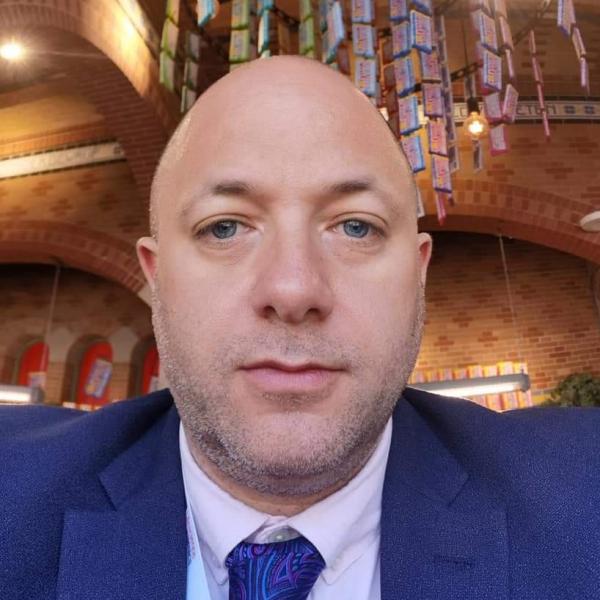Dr Matthew Hanchard
BA(Hons), MA, PhD, FHEA
Department of Sociological Studies
Research Fellow
(He/him)


Full contact details
Department of Sociological Studies
iHuman
The Wave
2 Whitham Road
Sheffield
S10 2AH
- Profile
-
Matthew locates himself between digital sociology and science and technology studies (STS). His research interests intersect the social consequences of technology and data, medical and pharmaceutical sociology, open science, and urban studies. Matthew also loves working with awkward mixed/multimodal methodologies including digital methods to render data meaningful. His has carried out research for projects funded by the UK Arts and Humanities Research Council (AHRC), Australian Research Council (ARC), European Commission (EC), Research England, and Wellcome Trust. Throughout, Matthew has produced various sole and co/joint-authored outputs, including two books, fifteen journal articles, and various book chapters, datasets, and other online items.
Matthew currently works in the iHuman Institute for the Wellcome Trust funded Orphan drugs: high prices, access to medicines and the transformation of biopharmaceutical innovation project. He acts as co-investigator for a subproject of the wider Wellcome Trust one, titled The social lives of patients’ stories: the roles of accounts of rare disease from innovation to authorisation and marketing of orphan drugs. Recently, he has been a co-investigator for the Research England funded Patient access to orphan drugs in the UK from patients’ perspectives project and principal investigator for the Research England funded Fostering cultures of open qualitative research project. He is also currently a working group member for the European Commission Co-operation on Science and Technology (COST) funded action Grassroots of Digital Europe: from Historic to Contemporary Cultures of Creative Computing. Alongside his research, Matthew occasionally teaches on the BA in Digital Media and Society and MA in Digital Media and Society courses, including as a dissertation supervisor.
Prior to joining the University of Sheffield in February 2021, Matthew worked at the University of Glasgow (2018 to 2021) for an AHRC project titled Beyond the Multiplex: Audiences for Specialised film. Whilst there, Matthew taught on modules across the University of Glasgow’s MA in Sociology, MSc in Digital Society, and Q-Step aligned MA in Quantitative Methods courses. He also acted as co-investigator for the University of Sydney-University of Glasgow partnership collaboration award (PCA) funded Smart publics: Public perceptions of smart street furniture in Glasgow and London project. Overlapping with his work at University of Glasgow, Matthew gained a PhD in Human Geography (part-time) from Newcastle University in December 2019, having started it at University of Sheffield in 2011. At the same time, he also conducted research for the COST funded Social Networks and Travel Behaviour action, including as principal investigator for short-term scientific mission hosted by the Norwegian Institute of Transport Economics (TØI) in October 2016. During his early PhD, Matthew taught at the University of Sheffield (as seminar leader) across various modules on the BA in Sociology, BA in Sociology with Social Policy, and MSc in Creative and Cultural Industries Management courses.
Prior to embracing an academic career, Matthew gained a BA (Hons) in Photography from the University of Derby (2006) and an MA in Photography and Urban Cultures (visual sociology) from Goldsmiths, University of London (2008). He worked full-time throughout and between all three degrees, accruing over two decades of industry experience spanning social housing policy, software development and implementation, staff training and development, and railway infrastructure maintenance planning.
- Research interests
-
Matthew’s work primarily revolves around examining the social consequences of technology and/or data flows – in particular, the Internet, web, and associated digital media. He holds a secondary interest in the sociology of health and illness, including the pharmaceutical sector. A firm grounding in Science and Technology Studies (STS) connects his interests and approach. He also enjoys playing with data (Qualitative and Quantitative) and wrangling awkward mixed and multi-modal methodologies, including digital methods. Matthew is open to network and/or discuss topic related to any of the below:
- Data Studies / Critical Data Studies
- Digital Cultural Heritage / Digital Humanities
- Digital Geographies / Digital Sociology / Digital Society
- Map Studies / Cartography Theory / Critical Cartography / Critical GIS
- Mobile Media Studies / New Media Studies / Internet Studies
- Medical Sociology
- Practice Theory (inc. Structuration Theory)
- Open Science / Open Research
- Research Methods
- Science and Technology Studies (STS)
- Publications
-
Books
- Engaging with Digital Maps Our Knowledgeable Deferral to Rough Guides. Palgrave Macmillan.


- Film audiences. Manchester University Press.


- Film Audiences Personal Journeys with Film.


Journal articles
- Discovering smart: early encounters and negotiations with smart street furniture in London and Glasgow. Digital Geography and Society.


- The dynamics of audience practices: Mobilities of film consumption. Participations, 19(1), 1-15.


- Developing a computational ontology to understand the relational aspects of audience formation. Emerald Open Research, 1(1).


- Exploring contemporary patterns of cultural consumption: offline and online film watching in the UK. Emerald Open Research, 1(1).


- Issue-networks as omitted publics in the construction of #rarediseaseday discourse. Wellcome Open Research, 7.


- Situated, Yet Silent: Data Relations in Smart Street Furniture. Journal of Urban Technology, 28(2), 1-22.


- The construction of rare disease discourse on YouTube: highlighting a disparity between policy rhetoric and patient practices around public engagement [version 1; peer review: awaiting peer review]. Wellcome Open Research, 6.


- Screen choice : the relations, interactions and articulations of watching film. Open Screens, 4(1), 1-12.


- Inequalities in regional film exhibition: policy, place and audiences. Journal of British Film and Television, 18(2), 198-222. View this article in WRRO


- Being part of an audience: Patterns of contemporary film audience experience. Participations, 17(2), 115-132.


- Developing a computational ontology to understand the relational aspects of audience formation. Emerald Open Research, 2.


- Exploring contemporary patterns of cultural consumption : offline and online film watching in the UK. Emerald Open Research, 2019(1).


- Using mixed-methods, a data model and a computational ontology in film audience research. Cultural Trends, 28(2-3), 118-131.


- How to define and treat materials in social theories of practice. EASST Review.


- Google Street-View: shaping the identity of spaces. Street Signs, 2010, 26-27.


- The construction of rare disease discourse on YouTube: highlighting a disparity between policy rhetoric and patient practices around public engagement. Wellcome Open Research, 6, 361-361.


- Digital Maps and Senses of Security: The Influence of a Veracious Media on Urban Life. Urban Planning, 5(4), 301-311. View this article in WRRO


Chapters
- Comparing Localised Film Culture in English Cities: The Diversity of Film Exhibition in Bristol and Liverpool, The Palgrave Handbook of Comparative New Cinema Histories (pp. 15-34). Springer International Publishing


- Using mixed-methods, a data model and a computational ontology in film audience research, Audience Data and Research (pp. 38-51). Routledge


- Social networks in transit, Digital Social Networks and Travel Behaviour in Urban Environments (pp. 108-131). Routledge


- Digital maps and anchored time, Time for mapping Manchester University Press


Conference proceedings papers
- Engaging digital maps: citizens’ uneven potential to effect change vs. the legitimation of an error-prone image of the world


- Through falling in love it’s like he’s seeing this landscape, seeing that beauty


- Developing a Computational Ontology from Mixed-Methods Research: A workflow and It’s challenges


- Towards a digital sociology of cartography


- STSM Scientific Report Presentation


- Digital Cartography and users


- ’Modelling socio-cultural factors in film genre


- Digital Citizens and their use of Maps


Reports
- Fostering cultures of open qualitative research


- Public Perceptions of Smart Street Furniture in London and Glasgow: insights for Policy and Practice


- Beyond the Multiplex - Interim Findings Report - October 2019


Website content
- Exploring the socio-demographics of screen choice for film-viewing.


- Using NVivo to structure a computational ontology.


- How NVivo can help you conquer writer’s block.


- Towards a Digital Sociology of Cartography.


- Have Digital Maps Altered Our Experience of Urban Surroundings?.


Posters
- According to Google Images: Visual epistemologies of climate change and biodiversity loss. University of Amsterdam.


Theses / Dissertations
Datasets
- Fostering cultures of open qualitative research: Dataset 2 – Interview Transcripts.


- Fostering cultures of open qualitative research: Dataset 1 – Survey Responses.


- Orphan Drugs - Dataset 2 - YouTube rare disease issue-network.


- Orphan Drugs - Dataset 1.


- Beyond the Multiplex: Ontology.


- Beyond the Multiplex-Policy and Industry document analysis.


- Anchoring digital maps.


- Beyond the Multiplex: R script for Latent Class Analyses.


- Beyond the Multiplex-Film Elicitation.


- Beyond the Multiplex-Three-wave Survey.


- Beyond the Multiplex - Audience Member Interview.


Presentations
- " Through Falling in Love It’s Like He’s Seeing This Landscape, Seeing That Beauty": The Film Worlds of’God’s Own Country’.


- Using a Computational Ontology and Mixed-Methods in Conceptualising Film Audiences.


- Modelling Socio-Cultural Factors in Film Genre Preferences: Empirically Comparing Bourdieu, Bauman and Goldthorpe.


- Developing a Computational Ontology from Mixed-Methods Research: A Workflow and Its Challenges.


- Engaging Digital Maps: Citizens’ Uneven Potential to Effect Change vs. the Legitimation of an Error-prone Image of the World.


- Using Data Ontology to Understand the Relational Dynamics of Film Audiences.


- Digital Citizens and their Use of Maps: How Digital Technologies Increase and Restrict Individual Agency in Everyday Life.


- Rough Guides: Does Situated Deferral to Defaults Anchor Action?.


- Location-based Services and Urban Navigation: a Qualitative Investigation of Transport Use in Oslo.


- Practice Hacks: Exploring the Centrality of Materials in Social Change.


- Practised Curation: How Power Distributed Through Digital Maps Anchors Everyday Life.


- PhD Overview.


- Engaging with Digital Maps Our Knowledgeable Deferral to Rough Guides. Palgrave Macmillan.
- Research group
- Grants
-
- Fostering cultures of open qualitative research
£13,914 - Research England
Principal Investigator (January 2023 to July 2023)
- Patient access to orphan drugs in the UK from patients’ perspectives
£4,575 - Research England
Co-Investigator (January 2022 - July 2022)
- Smart publics: Public perceptions of smart street furniture in Glasgow and London
AU $39,371 - University of Sydney-University of Glasgow PCA
Co-Investigator (February 2019 – May 2020)
- Fostering cultures of open qualitative research
- Teaching activities
-
Matthew has developed and delivered a broad range of teaching materials in academia over the past decade. This includes practical workshops on using R for descriptive statistics, through to digital methods research, social network analysis (SNA) with Gephi and qualitative data analyses with NVivo. Also, theory-based lectures on digital society and the emergence of platform economies, the welfare state, classical sociology, and cultural studies. Although he is currently employed on a research-only contract, with no formal teaching load, Matthew does occasionally deliver lectures and supervise dissertations for the BA in Digital Media and Society, BA in Sociology, and MA in Digital Media and Society courses.
Outside academia, Matthew has developed and delivered training material in a variety of roles, including holding responsibility for delivering a programme of hands-on workshops nationally on Microsoft SharePoint based Intranet site ownership to over 2,000 staff spread nationally across seventy offices/services.
- Postgraduate Supervision
Matthew has supervised students through a variety of dissertations around digital media, the internet, and the social consequences of technology. He is currently employed on a research-only contract, with no formal teaching load. As such, he is not currently able to provide MA/MSc or PhD supervision.
